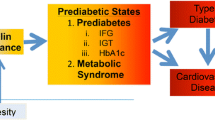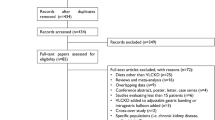Abstract
Purpose of Review
Cardiovascular disease (CVD) is highly associated with obesity and cardiometabolic dysfunction. This review will focus on three novel therapies that have been identified for potential treatment of obesity and its associated CVD risk factors.
Recent Findings
Intermittent fasting (IF) studies in animal models have shown improvements in cardiometabolic factors, including improved glucose metabolism, reduced inflammation, and reduced blood pressure. However, there is still a lack of prospective human trials to support results from animal-based studies and observational data. Studies of ketogenic diets in humans have produced mixed effects in CVD risk factors. It has been shown that the ketogenic diet (KD) increases low-density lipoprotein cholesterol (LDL-C) but decreases triglycerides. Additionally, implementation of KD in rodent studies have demonstrated increased insulin resistance and glucose intolerance. Bariatric surgery is a useful tool to help patients with obesity lose significant amounts of weight while alleviating CVD risk factors such as hypertension, LDL-C levels, triglyceride levels, and diabetes. The type of procedure influences degree of improvement in weight and CVD risk factors, yet complications remain possible.
Summary
IF and bariatric surgery offer potential for weight loss and treatment of CVD risk factors. Negative cardiovascular effects of KD have been noted and should be considered before recommending this diet to patients, particularly those with established cardiovascular disease.

Similar content being viewed by others
References
Papers of particular interest, published recently, have been highlighted as: • Of importance
Farzadfar F. Cardiovascular disease risk prediction models: challenges and perspectives. Lancet Glob Health. 2019;7(10):e1288–9.
Van Horn L, Carson JA, Appel LJ, Burke LE, Economos C, Karmally W, et al. Recommended dietary pattern to achieve adherence to the American Heart Association/American College of Cardiology (AHA/ACC) guidelines: a scientific statement from the American Heart Association. Circulation. 2016;134(22):e505–29.
Ludwig DS, Ebbeling CB. The carbohydrate-insulin model of obesity: beyond “calories in, calories out”. JAMA Intern Med. 2018;178(8):1098–103.
Anton S, Meohl K, Donahoo W, Marosi K, Lee S, Mainous A, et al. Flipping the metabolic switch: understanding and applying the health benefits of fasting. Obesity. 2018;26(2):254–68 The original review of a variety of IF studies.
Cabo D, Mattson MP. Effects of intermittent fasting on health, aging, and disease. N Engl J Med. 2019;381:2541–51.
Klein S, Sakuri Y, Romijn J, Carroll R. Progressive alterations in lipid and glucose metabolism during short-term fasting in young adult men. Am J Phys. 1993;265(5):E801–6.
Horne B, Muhlestein J, Anderson J. Health effects of intermittent fasting: hormesis or harm? A systematic review. Am J Clin Nutr. 2015;102(2):464–70.
Laermans J, Depoortere I. Chronobesity: role of the circadian system in the obesity epidemic. Obes Rev. 2016;17:108–25.
Linghao L, Su Y, Li F, Wang Y, Ma Z, Li ZSJ. The effects of daily fasting hours on shaping gut microbiota in mice. BMC Microbiol. 2000;20(65):1–8.
Lowe D, Wu N, Rohdin-Bibby L, Moore H, Kelly N, Liu Y, et al. Effects of time-restricted eating on weight loss and other parameters in patients with overweight and obesity. The TREAT Randomized Clinical Trial. JAMA Intern Med. 2020;180(11):1491–9.
Sutton E, Beyl R, Early K, et al. Early time-restricted feeding improves insulin sensitivity, blood pressure, and oxidative stress even without weight loss in men with prediabetes. Cell Metab. 2018;27(6):1212–21.
Wilkinson M, Manoogian E, Zadourian A, Navlakha S, Panda S, Taub P. Ten-hour time-restricted eating reduces weight, blood pressure, and atherogenic lipids in patients with metabolic syndrome. Cell Metab. 2020;31(1):1–13.
Trepanowski J, Kroeger C, Barnosky A, et al. Effect of alternate-day fasting on weight loss, weight maintenance, and cardioprotection among metabolically healthy obese adults. JAMA Intern Med. 2017;177(7):930–8 Evidence suggesting increased LDLc in alternate day fasting.
Rydners C, Thomas E, Zaman A, Pan Z, Catenacci V, Melanson E. Effectiveness of intermittent fasting and time-restricted feeding compared to continuous energy restriction for weight loss. Nutrients. 2019;11(10):24–42.
Schaumberg K, Anderson D, Reilly E, Anderson L. Does short-term fasting promote pathological eating patterns? Eat Behav. 2015;19:168–72.
Hall K, Chen K, Lam Y, et al. Energy expenditure and body composition changes after an isocaloric ketogenic diet in overweight and obese men. Am J Clin Nutr. 2016;104(2):324–33.
Mehran A, Templeman N, Brigidi G, Bamji S, Clee S, Johnson J. Hyperinsulinemia drives diet-induced obesity independently of brain insulin production. Cell Metab. 2012;16(2):723–37.
Muscogiuri G, Barrea L, Laudisio D, Pugliese G, Salzano C, Savastano S, et al. The management of very low-calorie ketogenic diet in obesity outpatient clinic: a practical guide. J Transl Med. 2019;17:356.
Kirkpatrick. Review of current evidence and clinical recommendations on the effects of low- carbohydrate and very-low-carbohydrate (including ketogenic) diets for the management of body weight and other cardiometabolic risk factors: a scientific statement from the National Lipid Association Nutrition and Lifestyle Task Force. J Clin Lipidol. 2019;13(5):689–711 Important statement from National Lipid Association on ketogenic and very low carbohydrate diets.
Kephart W, Pledge C, Roberson P, et al. The three-month effects of a ketogenic diet on body composition, blood parameters, and performance metrics in CrossFit trainees: a pilot study. Sports. 2018;6(1):1.
Aspry K, Kris-Etherton P, Kirkpatrick C. Very low carbohydrate and ketogenic diets and cardiometabolic risk. Am Coll Cardiol Expert Anal. 2020. https://www.acc.org/latest-incardiology/articles/2020/10/07/13/54/very-low-carbohydrate-and-ketogenic-diets-and-cardiometabolic-risk.
Barnard N, Katcher H, Jenkins D, Cohen J, Turner-McGrievy G. Vegetarian and vegan diets in type 2 diabetes management. Nutr Rev. 2009;67(5):255–63.
Falluca F, Fontana L, Falluca S, Pianesi M. Gut microbiota and Ma-Pi 2 macrobiotic diet in the treatment of type 2 diabetes. World J Diabetes. 2015;6(3):403–11.
Kosinski C, Jornayvaz F. Effects of ketogenic diets on cardiovascular risk factors: evidence from animal and human studies. Nutrients. 2017;9(5):517.
Koeth RA, Lam-Galvez BR, Kirsop J, Wang Z, Levison BS, Gu X, et al. l-Carnitine in omnivorous diets induces an atherogenic gut microbial pathway in humans. J Clin Invest. 2019;129(1):373–87.
Song M, Fung T, Hu F, Willett W, Longo V, Chan A, et al. Animal and plant protein intake and all-cause and cause-specific mortality: results from two prospective US cohort studies. JAMA Intern Med. 2016;176(10):1453–63.
Li S, Flint A, Pai J, Forman J, Hu F, Willett W, Rexrode K, Mukamal K, Rimm E. Low Carb diet from plant or animal source and mortality on MI survivors. J Am Heart Assoc. 2014;3(5):e00169.
Kang H, Chung da E, Kim D, Kim H. Food for thought: the ketogenic diet and adverse effects in children. Epilepsia. 2004;45(9):1116–23.
Aminian A, Zajichek A, Arterburn DE, Wolski KE, Brethauer SA, Schauer PR, et al. Association of metabolic surgery with major adverse cardiovascular outcomes in patients with type 2 diabetes and obesity. JAMA. 2019;322(13):1271–82 This study demonstrated significant reductions beyond MACE (major adverse cardiac events) including lower rates of heart failure, atrial fibrillation, and diabetic neuropathy over the course of 8 years.
Heneghan HM, Meron-Eldar S, Brethauer SA, Schauer PR, Young JB. Effect of bariatric surgery on cardiovascular risk. Am J Cardiol. 2011;108(10):1499–507.
Ammar W, Basset HA, AL Faramawy A, Hegazy T, Yasser S. Bariatric surgery and cardiovascular outcome. Egypt Heart J. 2020;72(67):1–10.
Alfredo G, Roberta M, Massimiliano C, Michele L, Nicola B, Adriano R. Long-term multiple intragastric balloon treatment—a new strategy to treat morbid obese patients refusing surgery: prospective 6-year follow-up study. Surg Obes Relat Dis. 2014;10(2):307–11.
Hedjoudje A, Abu Dayyeh BK, Cheskin LJ, Adam A, Neto MG, Badurdeen D, et al. Efficacy and safety of endoscopic sleeve gastroplasty: a systematic review and meta-analysis. Clin Gastroenterol Hepatol. 2020;18(5):1043–1053.e4. https://doi.org/10.1016/j.cgh.2019.08.022.
Novikov AA, Afaneh C, Saumoy M, Parra V, Shukla A, Dakin GF, et al. Endoscopic sleeve gastroplasty, laparoscopic sleeve gastrectomy, and laparoscopic band for weight loss: how do they compare? J Gastrointest Surg. 2018;22(2):267–73.
Fourman MM, Saber AA. Robotic bariatric surgery: a systematic review. Surg Obes Relat Dis. 2012;8(4):483–8.
Lee JH, Nguyen QN, Le QA. Comparative effectiveness of 3 bariatric surgery procedures: Roux-en-Y gastric bypass, laparoscopic adjustable gastric band, and sleeve gastrectomy. Surg Obes Relat Dis. 2016;5:997–1002.
Himpens J, Cadière GB, Bazi M, Vouche M, Cadière B, Dapri G. Long-term outcomes of laparoscopic adjustable gastric banding. JAMA Netw Arch Surg. 2011;146(7):802–7.
Jaber J, Glenn J, Podkameni D, Soto F. A 5-year history of laparoscopic gastric band removals: an analysis of complications and associated comorbidities. Obes Surg. 2019;29(4):1202–6.
Peterli R, Wölnerhanssen BK, Peters T, Vetter D, Kröll D, Borbély Y, et al. Effect of laparoscopic sleeve gastrectomy vs laparoscopic Roux-en-Y gastric bypass on weight loss in patients with morbid obesity: the SM-BOSS randomized clinical trial. JAMA. 2018;319(3):255–65.
Yeung KT, Penney N, Ashrafian L, Darzi A, Ashrafian H. Does sleeve gastrectomy expose the distal esophagus to severe reflux?: a systematic review and meta-analysis. Ann Surg. 2020;271(2):257–65.
Schauer PR, Ikramuddin S, Gourash W, Ramanathan R, Luketic J. Outcomes after laparoscopic Roux-en-Y gastric bypass for morbid obesity. Ann Surg. 2000;232(4):515–29.
Lupoli R, Lembo E, Saldalamacchia G, Avola CK, Angrisani L, Capaldo B. Bariatric surgery and long-term nutritional issues. World J Diabetes. 2017;8(11):464–74.
Kallies K, Rogers AM, American Society for Metabolic and Bariatric Surgery Clinical Issues Committee. American Society for Metabolic and Bariatric Surgery updated statement on single-anastomosis duodenal switch. Surg Obes Relat Dis. 2020;16(7):825–30.
Shoar S, Poliakin L, Rubenstein R, Saber A. Single anastomosis duodeno-ileal switch (SADIS): a systematic review of efficacy and safety. Obes Surg. 2018;28:104–13.
Bashah M, Aleter A, Baazaoui J, El-Menyar A, Torres A, Salama A. Single anastomosis duodeno-ileostomy (SADI-S) versus one anastomosis gastric bypass (OAGB-MGB) as revisional procedures for patients with weight recidivism after sleeve gastrectomy: a comparative analysis of efficacy and outcomes. Obes Surg. 2020;30(12):4715–23.
Abdelhamid A, Albalkiny S, Abdel-Samee K, Mustafa A. Comparative study between single anastomosis Duodeno–Ileal bypass with sleeve gastrectomy and mini-gastric bypass surgery for the treatment of morbid obesity. QJM. 2020;113(1):72–83.
Carlsson MS, Sjöholm K, Jacobson P, et al. Life expectancy after bariatric surgery in the Swedish obese subjects study. N Engl J Med. 2020;383(16):1535–43 Large cohort study demonstrating improved life expectancy with bariatric surgery.
Adams TD, Gress RE, Smith SC, et al. Long-term mortality after gastric bypass surgery. N Engl J Med. 2007;357(8):753–61.
Näslund E, Stenberg E, Hofmann R, Ottosson J, Sundbom M, Marsk R, Svensson P, Szummer K, Jernberg T. Association of metabolic surgery with major adverse cardiovascular outcomes in patients with previous myocardial infarction and severe obesity: a nationwide cohort study. Circulation. 2021;143(15):1458–1467.
Ibrahim AM, Ghaferi AA, Thumma JR, Dimick JB. Variation in outcomes at bariatric surgery centers of excellence. JAMA Surg. 2017;152(7):629–36.
Author information
Authors and Affiliations
Corresponding author
Ethics declarations
Conflict of Interest
Dr. Roslin reports grants and non-financial support from Medtronic, personal fees from Medtronic and Ethcion/Johnson and Johnson, and other from Revmedica and Plasmatica, outside the submitted work.
The other authors declare that they have no conflict of interest.
Human and Animal Rights and Informed Consent
This article does not contain any studies with human or animal subjects performed by any of the authors.
Additional information
Publisher’s Note
Springer Nature remains neutral with regard to jurisdictional claims in published maps and institutional affiliations.
This article is part of the Topical Collection on Lipid Abnormalities and Cardiovascular Prevention
Rights and permissions
About this article
Cite this article
Becker, A., Gaballa, D., Roslin, M. et al. Novel Nutritional and Dietary Approaches to Weight Loss for the Prevention of Cardiovascular Disease: Ketogenic Diet, Intermittent Fasting, and Bariatric Surgery. Curr Cardiol Rep 23, 85 (2021). https://doi.org/10.1007/s11886-021-01515-1
Accepted:
Published:
DOI: https://doi.org/10.1007/s11886-021-01515-1




